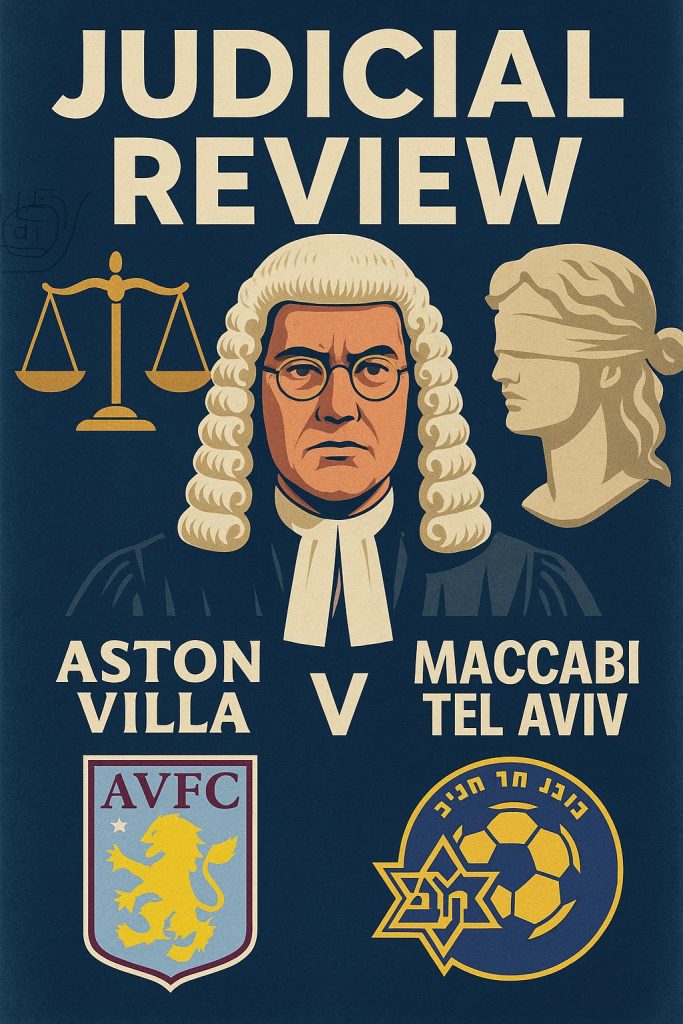When politics steps onto the pitch: Aston Villa v Tel Aviv decision and the quiet reckoning to come
There is a judicial review brewing in Birmingham, and it is not about bin collections or bus lanes. It is about football, and more precisely, how a public body decided that fans of Maccabi Tel Aviv should not be allowed to attend a Europa Conference League game at Aston Villa. The case now looms as a test of fairness, governance, and the ability of our institutions to make safety decisions free from political contagion.
The court will not decide whether the match should have been played. It will look instead at how the decision was reached, whether it was lawful, proportionate, and procedurally fair, and whether those sitting around the table fulfilled their statutory duties.

How the decision was made
Under current arrangements, the Aston Villa Safety Advisory Group (SAG) is chaired not by a councillor but by a senior council officer. Years ago, such meetings were politically led; now they are administrative and multi-agency by design. The chair’s task is to coordinate the evidence and ensure that every agency, including the police, fire, ambulance, transport, and licensing authorities, contributes independently to the overall safety plan.
In this case, it is understood that no formal vote was taken. The outcome appears to have been agreed without a recorded decision, based on a collective sense that hosting Israeli fans posed too great a risk.
That alone may prove critical. Judicial review does not question wisdom; it examines process. A body exercising public functions must show that it made decisions transparently, lawfully, and with proper reasoning. If a conclusion of such significance was reached by informal nods and murmurs rather than documented assent, the court will take a very close look indeed.
Councillors, politics and public duty
Several councillors attended the meeting as observers or participants. Two are said to have previously made strong public statements about Gaza and the conflict in the Middle East. That, in itself, is not illegal, and councillors are entitled to opinions. But if those opinions coloured their stance on a matter of public administration, the question of apparent bias arises.
The law is crystal clear. In quasi-judicial or advisory settings, elected members must act impartially and declare relevant interests. A councillor may hold a view, but they must not have made up their mind in advance. If they have publicly campaigned on a related issue, or if a fair-minded observer could think they had, their continued involvement risks tainting the process.
Reports that one councillor later posted on social media celebrating the outcome with the words “we’ve done this” only heighten that concern. In legal terms, this sort of comment is not harmless exuberance. It can be taken as evidence of predetermination. A judicial review would ask whether the presence and conduct of such councillors created an appearance of bias that undermines the integrity of the group’s advice.
The police and the “too difficult” defence
West Midlands Police reportedly advised that visiting supporters from Tel Aviv could pose a serious safety risk. Yet details of that risk assessment remain largely undisclosed. Some accounts suggest it referred to previous disorder involving Israeli fans abroad, although other sources argue that many of those incidents were misrepresented and that Israeli supporters were often the targets rather than the cause.
If the police adopted a position of “it’s more trouble than it’s worth”, that will not satisfy a court. Public authorities may cite resource pressures, but they cannot justify unlawful or discriminatory decisions on grounds of convenience. Judges recognise the realities of policing budgets, but they still require evidence that decisions were proportionate, evidence-based, and fair.
A failure to consider alternative measures such as enhanced stewarding, segregated entry, or adjusted timings could prove decisive.
Where were the other voices?
The fire service, ambulance trust, and other statutory partners all have professional duties within a SAG. Their role is not symbolic. They are expected to test assumptions, challenge risk assessments, and bring their own expertise to the table.
If they simply nodded along in silence or allowed the police view to dominate, the entire purpose of a multi-agency process collapses. Silence in a meeting of this kind is not neutrality; it is abdication.
The equality duty
One of the strongest lines of legal scrutiny will be the Public Sector Equality Duty under section 149 of the Equality Act 2010. Whenever a public body takes a decision affecting people defined by race or religion, it must consciously consider how that decision might impact them. That means showing, on record, that equality and proportionality were weighed before action was taken.
If this exclusion of Israeli and Jewish supporters was approved without such consideration or without any recorded equality analysis, it could be fatal to the lawfulness of the decision. Courts have repeatedly found that “due regard” to equality is not a box-ticking exercise; it must be demonstrably part of the reasoning.
Challenge from the Campaign Against Antisemitism
Now the Campaign Against Antisemitism (CAA) has entered the arena. The organisation, known for its well-resourced and serious approach to legal activism, announced that it is formally notifying Birmingham City Council and West Midlands Police of its intention to bring judicial review proceedings.
Their statement pulls no punches:
“Police forces and local councils must do whatever it takes to ensure that Britain is safe for everyone. The decision has rightly been condemned by the Government and opposition parties. We understand that the decision was not made by Aston Villa.
“We will do whatever it takes to overturn this pernicious ban which has humiliated and angered the whole country. Britain is increasingly waking up to the extremism in our midst but now we must all fight the instinctive appeasement within the authorities and our law enforcement.”
That is strong language, and it ensures the matter will not quietly disappear.
Public money and public silence
My own understanding of these events has been gathered from reliable sources, checked and cross-checked where possible. Yet attempts to confirm certain key details have been met with a wall of silence from some official quarters.
That silence is disappointing. The SAG is a public body, funded by public money, operating in the name of public safety. Openness should be its default setting. Instead, the shutters have come down.
Meanwhile on X …
The Prime Minister’s intervention
Even the Prime Minister has waded in, saying the match should have gone ahead, a rare comment on a local administrative matter. While such statements carry no legal weight in the courtroom, they show how far this story has travelled. What began as a local safety decision has become a national debate about governance, equality, and the limits of political caution.







